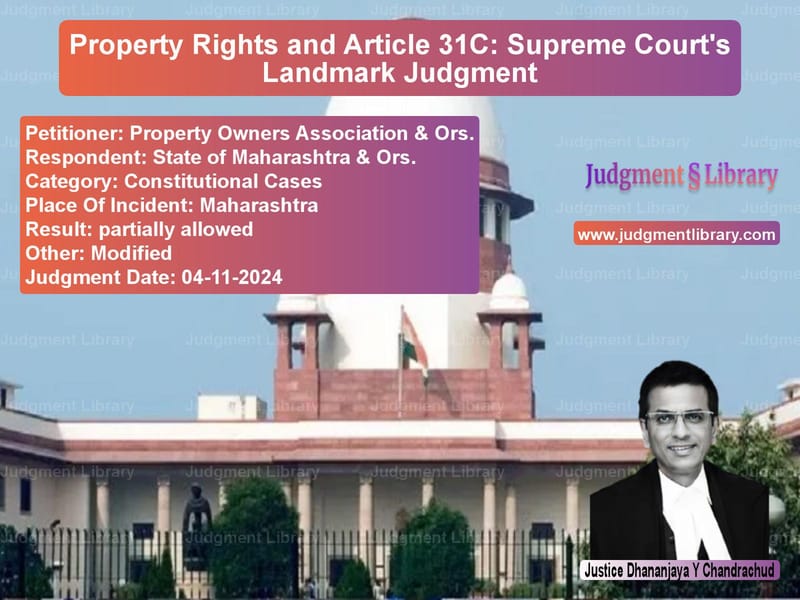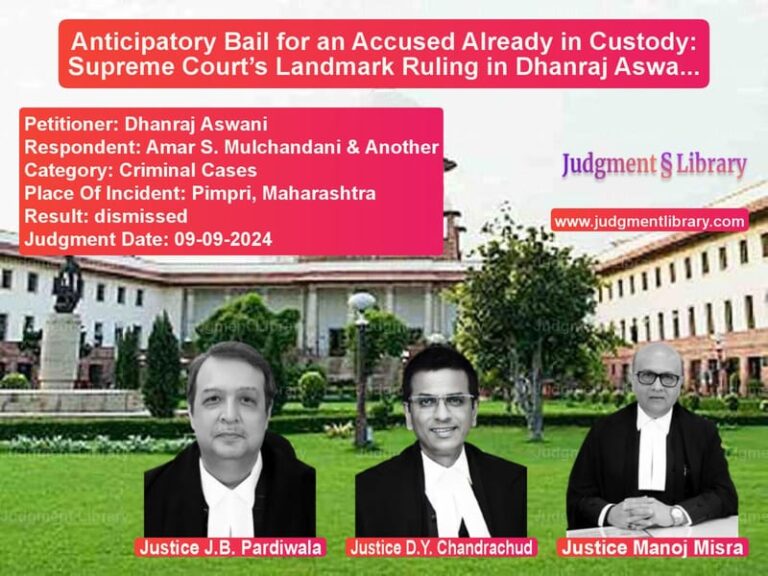Property Rights and Article 31C: Supreme Court’s Landmark Judgment
The Supreme Court of India recently delivered a historic ruling in the case of Property Owners Association & Ors. vs. State of Maharashtra & Ors. The case centered on the constitutional validity of Article 31C and its impact on property rights. The judgment reaffirmed the importance of judicial review and balanced the relationship between Directive Principles of State Policy and Fundamental Rights. This ruling serves as a crucial precedent in interpreting land acquisition laws and protecting citizens’ rights against arbitrary state action.
Background of the Case
The petitioners, representing various property owners, challenged the provisions of Article 31C, arguing that they were being misused to bypass constitutional safeguards related to property rights. Article 31C was originally intended to shield laws that implement Directive Principles from being challenged for violating fundamental rights. However, over time, it was used by the government to justify land acquisition without fair compensation.
The petitioners contended that such application of Article 31C was unconstitutional and encroached upon fundamental rights under Articles 14 (Right to Equality) and 19 (Right to Property). The State of Maharashtra, in contrast, argued that the provision was essential to facilitate equitable land distribution and socio-economic reforms.
Arguments by the Petitioners
The petitioners, led by senior legal counsel, presented the following arguments:
- Article 31C was initially introduced to protect welfare legislation but had been expanded beyond its intended purpose, allowing the government to acquire private properties without fair compensation.
- The provision undermined judicial review by preventing courts from scrutinizing laws that allegedly implemented Directive Principles.
- State action under Article 31C resulted in the violation of fundamental rights, particularly the right to own property and the right to a fair and just legal process.
- The arbitrary acquisition of private property without judicial intervention could lead to executive overreach and threaten individual liberty.
- Article 31C contradicted earlier Supreme Court rulings that emphasized the balance between Directive Principles and Fundamental Rights.
Arguments by the Respondents
The State of Maharashtra defended the use of Article 31C, stating:
- The provision was necessary to implement progressive land reforms and redistribute land equitably.
- The Directive Principles outlined in Part IV of the Constitution required affirmative action by the state to ensure economic justice.
- Challenging laws under the guise of fundamental rights obstructed welfare measures designed to uplift marginalized communities.
- The Supreme Court had previously upheld laws protected under Article 31C, setting a valid precedent for its continued application.
Supreme Court’s Observations
Chief Justice Dhananjaya Y Chandrachud, delivering the judgment, provided a detailed analysis of the interplay between Directive Principles and Fundamental Rights. The Court made the following key observations:
1. The Scope of Article 31C Must Be Limited
- Article 31C was introduced with the specific purpose of safeguarding laws related to economic justice, but its application had been expanded beyond this intent.
- Excessive reliance on Article 31C to override fundamental rights violated the Basic Structure Doctrine of the Constitution.
- Directive Principles, while crucial, could not be given absolute precedence over Fundamental Rights.
2. Judicial Review Is a Fundamental Feature of the Constitution
- The judiciary has a duty to scrutinize laws that restrict fundamental rights to ensure they adhere to constitutional principles.
- Preventing courts from reviewing state actions undermines the system of checks and balances.
3. Right to Property Must Be Protected
- The Court reaffirmed that the right to property, although no longer a fundamental right, remains a constitutional right under Article 300A.
- State action in acquiring property must be just, fair, and equitable.
Judgment and Conclusion
The Supreme Court, after thorough deliberation, ruled that:
- Certain provisions of Article 31C that curtailed judicial review were unconstitutional.
- The government must ensure that any law passed under Article 31C adheres to constitutional principles and does not arbitrarily infringe upon citizens’ rights.
- The petition was partially allowed, and the application of Article 31C was modified to ensure compliance with constitutional safeguards.
This landmark judgment reaffirmed the importance of judicial oversight in land acquisition cases. It set a crucial precedent, ensuring that while state governments have the authority to implement social reforms, they must do so within the constitutional framework. This ruling serves as a safeguard against executive overreach and protects the fundamental rights of property owners across India.
Petitioner Name: Property Owners Association & Ors..Respondent Name: State of Maharashtra & Ors..Judgment By: Justice Dhananjaya Y Chandrachud.Place Of Incident: Maharashtra.Judgment Date: 04-11-2024.
Don’t miss out on the full details! Download the complete judgment in PDF format below and gain valuable insights instantly!
Download Judgment: property-owners-asso-vs-state-of-maharashtra-supreme-court-of-india-judgment-dated-04-11-2024.pdf
Directly Download Judgment: Directly download this Judgment
See all petitions in Fundamental Rights
See all petitions in Constitution Interpretation
See all petitions in Public Interest Litigation
See all petitions in Judgment by Dhananjaya Y Chandrachud
See all petitions in partially allowed
See all petitions in Modified
See all petitions in supreme court of India judgments November 2024
See all petitions in 2024 judgments
See all posts in Constitutional Cases Category
See all allowed petitions in Constitutional Cases Category
See all Dismissed petitions in Constitutional Cases Category
See all partially allowed petitions in Constitutional Cases Category







